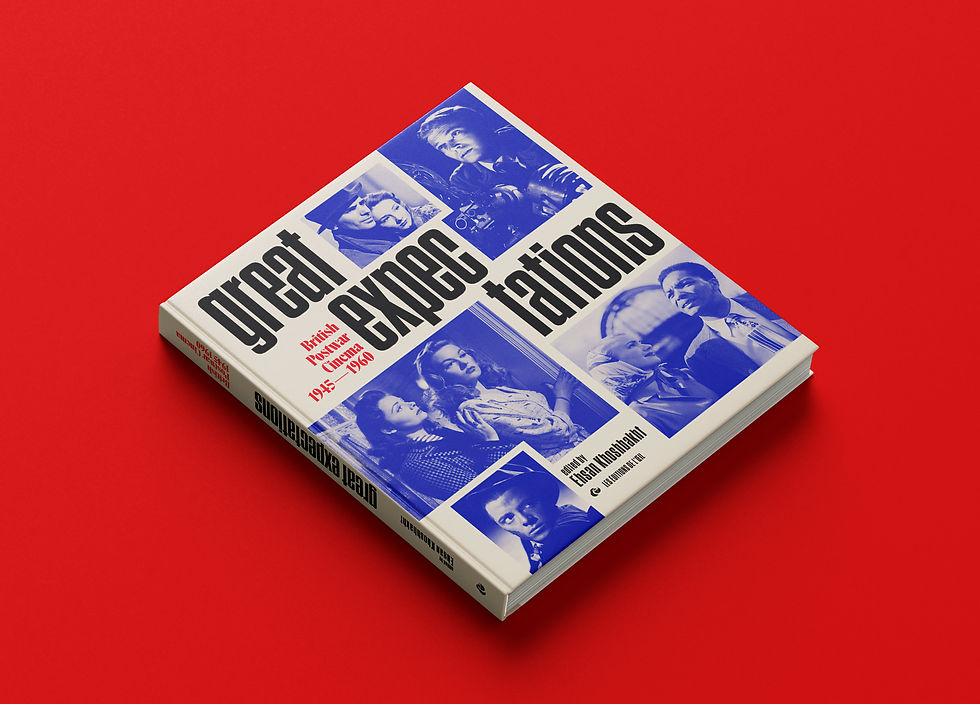top of page
Les Éditions de l’Œil
Avoir l’œil aux aguets. Cligner de l’œil, faire de l’œil ou même taper dans l’œil. Faire les yeux ronds, puis les yeux doux... Avoir l’œil, et le bon, ne pas avoir froid aux yeux sans avoir peur de se rincer l’œil de temps en temps, garder les yeux grands ouverts ou encore jeter un œil. Tout est question de regard, ce regard que nous voulons promeneur sur la création vivante dans le monde. C’est ainsi que les éditions de l’Œil s’espèrent passeurs d’images, d’idées, d’arts et d’artistes.

ARTICLE 018 - 08.08.2025
Great Expectations
A new book directed by Ehsan Khoshbakht about british postwar cinema, on the occasion oh the Locarno Film Festival 2025
READ THE INTRODUCTION
by Ehsan Khoshbakht
This book serves a dual purpose: it accompanies a 45-film British postwar cinema retrospective at Locarno Film Festival; at the same time, it is designed to be read independently and enjoyed as a standalone publication of nearly 40 essays on the distinctive voices of British cinema 1945–1960.
The retrospective was structured around the question of Britishness and life in the British Isles as reflected through cinema. Therefore, the selection criteria focused exclusively on contemporary films. It excludes period pieces, and films with fantastical premises, which saw a fascinatingly wild resurgence with Hammer horror. Even if this automatically leaves out Second World War films, the war’s impact lingers behind most of the characters’ motives, informs their course of action, and shapes the battered landscape of cities still rife with black markets and ration cards. The programme, therefore, examines the war’s aftermath – a victor’s landscape of loss and displacement.
While celebrating the masters and craftsmen of the studio era, this book deliberately excludes the New Wave and kitchen sink movements, whose early years overlapped with the period covered here. By 1945, the glory days of the documentary movement had also already passed. Although the retrospective includes a handful of documentaries for context, the primary focus remains on narrative films. (For the list of the retrospective titles, see the book’s Appendix.)
These selection criteria have been consciously subjective, as the programme celebrates the subjectivity of British films; this is precisely what makes them special. Great Expectations (which, given the hardship almost every character in these films goes through, should be taken with a touch of bitter irony) sketches different shades of popular cinema that are grounded in a reality from which they depart according to their own generic, authorial and formal convictions.
This is not a “lost continent”, as it was once dubbed, but for an international audience it is still a largely underexplored national cinema. In recent years, however, this gap in knowledge and lack of access has been dramatically reduced through the meticulous work of the BFI National Archive, as well as various companies and individuals dedicated to reviving these films. Today, there is a steady resurgence of both minor and major works of British cinema, available in fine digital transfers through DVD and Blu-ray labels – offering a real opportunity for self-education, if not for diving into the pleasures of a cinematic golden age.
This book is divided into two parts. The first, Visions, establishes brief historical contexts essential for a deeper understanding of the subject. It includes essays on the role of women behind the camera, children in front of it, and the often disastrous critical reception of these films in Britain. Visions also contains two chapters on British cinema’s exchanges with Hollywood – both in offering asylum and work to blacklisted American directors and in responding creatively to the rise of American film noir. The second half, Filmmakers, presents vivid critical profiles of 30 directors – though this list could have easily expanded to 50.
British cinema has often embraced the perspective of outsiders, whether through stories of strangers arriving in unfamiliar places and transforming them (and being transformed in return) or through filmmakers of foreign origin – such as Emeric Pressburger, Alberto Cavalcanti, and Joseph Losey – who contributed some of the most distinctively British films ever made. I, too, am one of those “inside outsiders”, having first discovered British cinema on television far from where these films were produced. The British films of the 1940s and 50s helped me grow up – sometimes too quickly, much like the child characters in these films. Years later, I found myself living in that country.
Having experienced British cinema both from outside and inside, I have found tremendous joy in discovering a country through its films, in parallel with living (and paying tax) in it. This book – and the retrospective – is my tribute to my adopted country.
bottom of page

